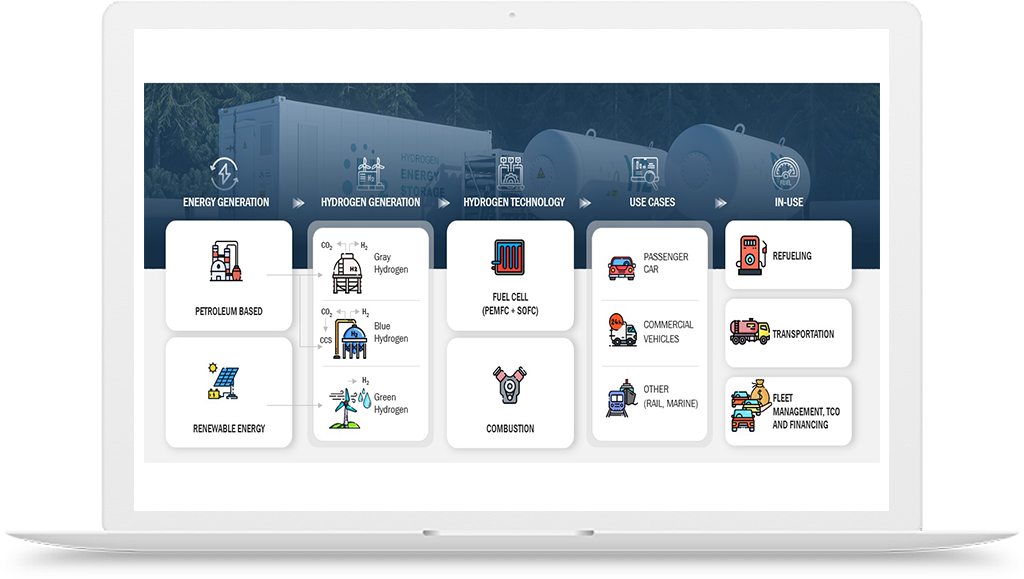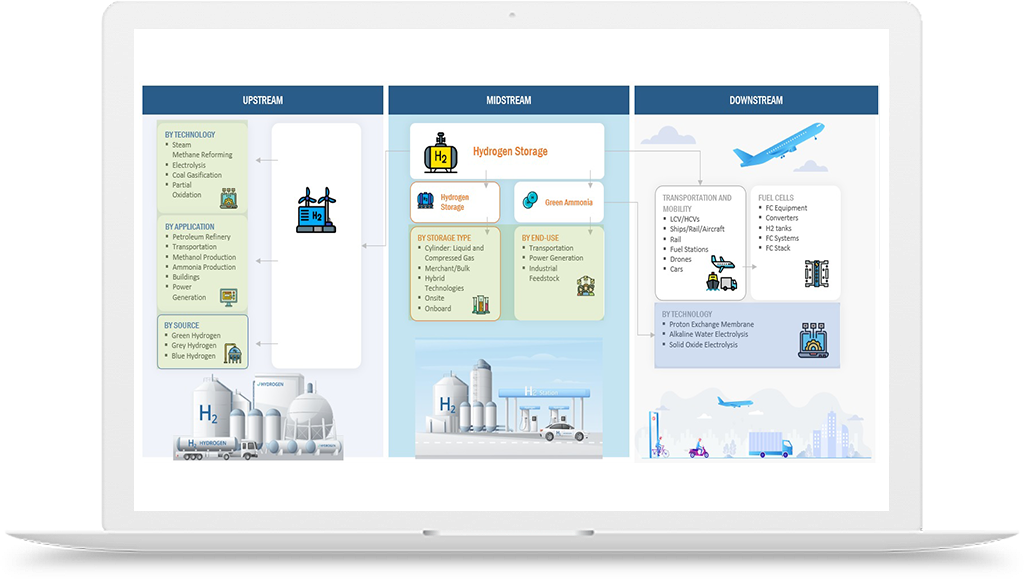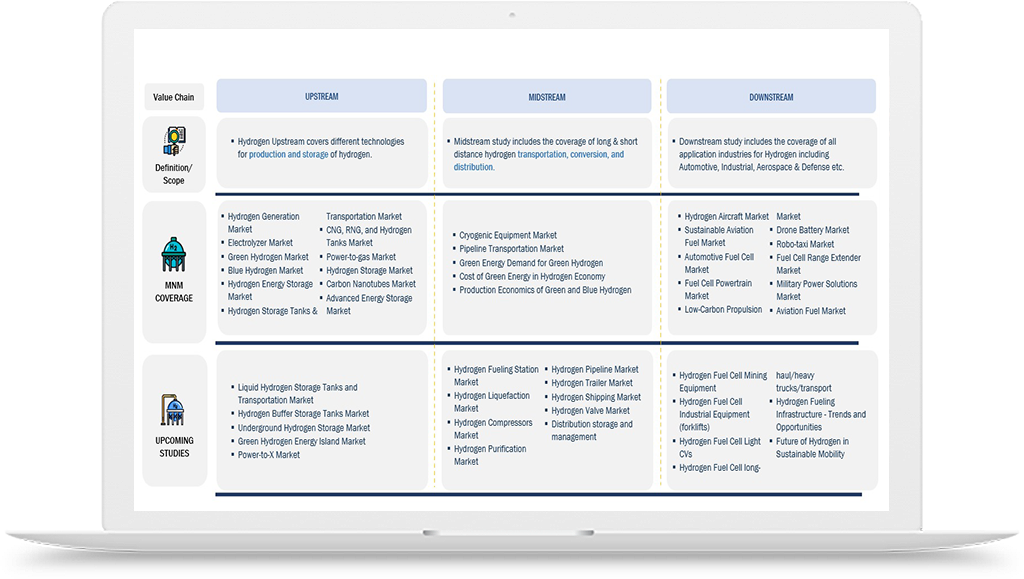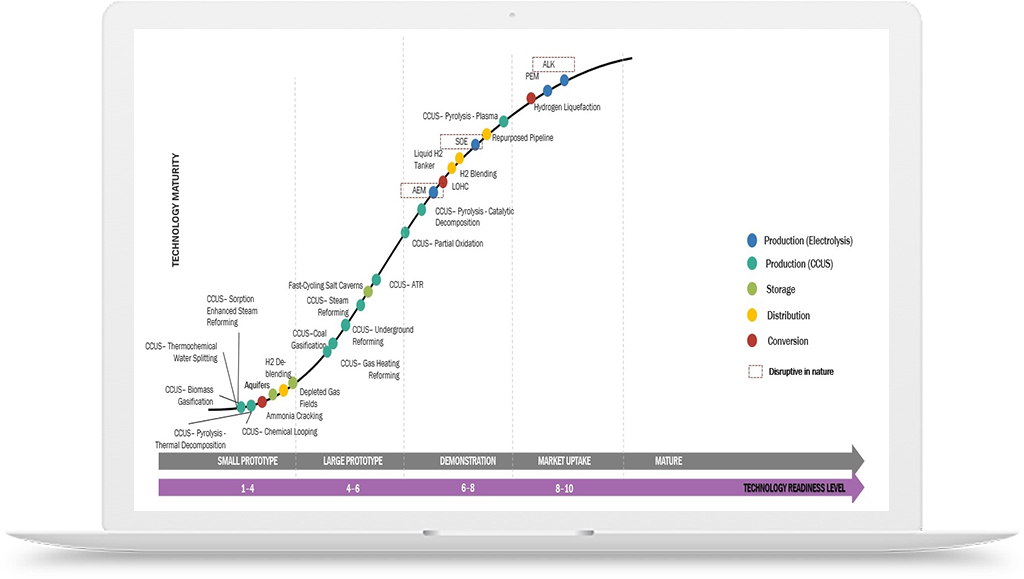Hydrogen Use Cases
Hydrogen has garnered considerable recognition as a versatile and sustainable energy carrier, featuring myriad use cases across diverse sectors. In this discussion, we will delve into the most promising hydrogen use cases and underscore the sectors willing to invest premium value in its applications, specifically in chemicals and industry, automotive, and aerospace/defense.
Chemicals and Industry:
The chemicals and industry sector is undergoing a paradigm shift toward sustainability, with hydrogen emerging as a game-changer. This versatile element is finding diverse applications, revolutionizing traditional processes and contributing to a greener, more efficient industrial landscape. This article explores the transformative Hydrogen Use Cases in the chemicals and industry sector.
Hydrogen plays a crucial role in the chemicals and industry sector, offering several lucrative use cases:
The various applications of hydrogen are driving a significant revolution in the chemicals and industries sector. Hydrogen's essential functions as a clean feedstock, an effective reducing agent, and a source of clean energy have gained prominence in response to the worldwide search for sustainable alternatives. Adoption of hydrogen in these many applications not only improves operational efficiency but also synchronizes companies with global endeavors to realize a future that is more ecologically friendly and sustainable.
- Hydrogen is an Essential Feedstock: In the synthesis of chemicals, hydrogen serves as a major feedstock. It is a basic building block since it is involved in the synthesis of methanol, ammonia, and other important compounds. In addition to increasing the effectiveness of chemical reactions, these hydrogens use cases also promote the development of essential goods for sectors like vitamins and medicines.
- Hydrogen in Hydrogenation Processes: The use of hydrogen to unsaturated chemicals is the basis of hydrogenation processes, which are essential in the food business. This has special relevance to the lipid and oil production process, helping to create food items with distinct properties and textures and demonstrating a variety of hydrogen use cases in culinary applications.
- On-site Power Generation: In industrial facilities, hydrogen fuel cells are gaining popularity as an on-site power generation option. This decentralized strategy helps to lower the overall carbon footprint while also ensuring consistent power.
Automotive Sector:
Hydrogen holds great potential in the automotive industry, particularly for fuel cell electric vehicles (FCEVs). FCEVs utilize hydrogen fuel cells to produce electricity, providing a viable alternative to conventional internal combustion engines. Some lucrative use cases include:
Transportation is changing as a result of the car sector's adoption of hydrogen. Hydrogen is causing a paradigm change in the direction of cleaner, more effective, and sustainable mobility options, from fuel cell cars and heavy-duty transportation to creative uses in trains and partnerships with battery electric vehicles. The automobile sector makes a substantial contribution to the ongoing international efforts to cut carbon emissions and create a more ecologically sensitive and greener future as it continues to adopt hydrogen use cases.
- Hydrogen Refueling Infrastructure: A strong infrastructure for hydrogen refueling is needed to facilitate the mass adoption of FCEVs. Businesses who make investments in the construction of hydrogen distribution systems and filling stations can profit from the rising demand for hydrogen fuel. These infrastructural initiatives may provide new company prospects and long-term revenue streams.
- Longer Driving Range: Compared to battery electric cars (BEVs), hydrogen fuel cell vehicles have a longer driving range. Hydrogen presents a viable alternative for extended-range transportation due to its rapid refueling time and higher energy density, which alleviate the range anxiety frequently encountered with electric vehicles.
- Hydrogen-Powered Internal Combustion Engines (H2ICE): Hydrogen is a useful fuel substitute for fuel cells in internal combustion engines (H2ICE). Hydrogen internal combustion engines (H2ICE) can function as a transitional technology, enabling the conversion of current engines and infrastructure to run on hydrogen, while also having lower emissions than conventional gasoline engines.
- Infrastructure Development: The automobile industry's use of hydrogen extends beyond the establishment of new infrastructure. The establishment of a large ecosystem for environmentally friendly mobility and the widespread adoption of automobiles driven by hydrogen rely on investments in hydrogen recharge stations.
Aerospace/Defense Sector:
The aerospace and defense industries also present lucrative use cases for hydrogen, primarily due to its high energy density and potential for various applications:
The aerospace and defense industry is undergoing a dramatic transition as it adopts hydrogen's numerous applications. The future of aerospace and military technology is significantly shaped by hydrogen, as this essay demonstrates by examining how hydrogen use cases are fostering innovation and sustainability in this competitive market.
- Rocket Propulsion: Because of its clean combustion, low molecular weight, and high specific impulse, hydrogen has been utilized as a rocket propellant. High-performance space missions are made possible by the use of hydrogen in rocket power by both commercial space enterprises and space authorities.
- Hydrogen-Powered Aircraft: Creating hydrogen-powered aircraft is one of the sector's ground-breaking uses of hydrogen. Applications for hydrogen include fuel cells, which offer an environmentally beneficial and clean substitute for conventional aviation fuels, lowering greenhouse gas emissions and improving air travel.
- Hydrogen Fuel Cells for Drones: The military sector is finding more applications for hydrogen as a result of the usage of hydrogen fuel cells in unmanned aerial vehicles (UAVs) and drones. This application shows how versatile hydrogen is in meeting the evolving needs of defense technologies by offering longer flight periods and additional operational capabilities.
- Lightweight Hydrogen Storage: For hydrogen use cases in flight, lightweight hydrogen storage technologies must be developed. These systems allow for the efficient storage and delivery of hydrogen for a range of applications, ensuring that the weight constraints required by aircraft technologies are met without compromising performance.
- Hydrogen-Powered UAV Surveillance: Using hydrogen-powered UAVs to improve surveillance capabilities is one of the use cases for hydrogen. These unmanned systems are perfect for defense and reconnaissance duties because of their extended flight durations and minimal environmental impact.
- Military Applications: For military use, hydrogen fuel cells can be advantageous, especially for off-grid or distant operations. Military vehicles, equipment, and facilities can rely on fuel cells as a dependable and noiseless power supply. Hydrogen has the potential to be employed in fuel cell-powered unmanned aerial vehicles (UAVs), leading to longer flight durations and lower operating expenses.
In conclusion, hydrogen has a number of lucrative uses across numerous industries. Refining petroleum, ammonia, and methanol requires hydrogen, which benefits the chemicals and industries sector. Promising advances for the automobile sector include the construction of infrastructure for hydrogen fuel cell vehicles and hydrogen filling stations. Lastly, the aerospace and defense industries employ hydrogen for rocket and military propulsion. These industries are willing to pay more for hydrogen because to its efficiency, sustainability, and ability to meet their specific demands; this creates opportunity for businesses along the hydrogen value chain. Hydrogen applications in the aerospace and defense sectors offer a ground-breaking advancement toward cleaner, more robust, and efficient technology.
















